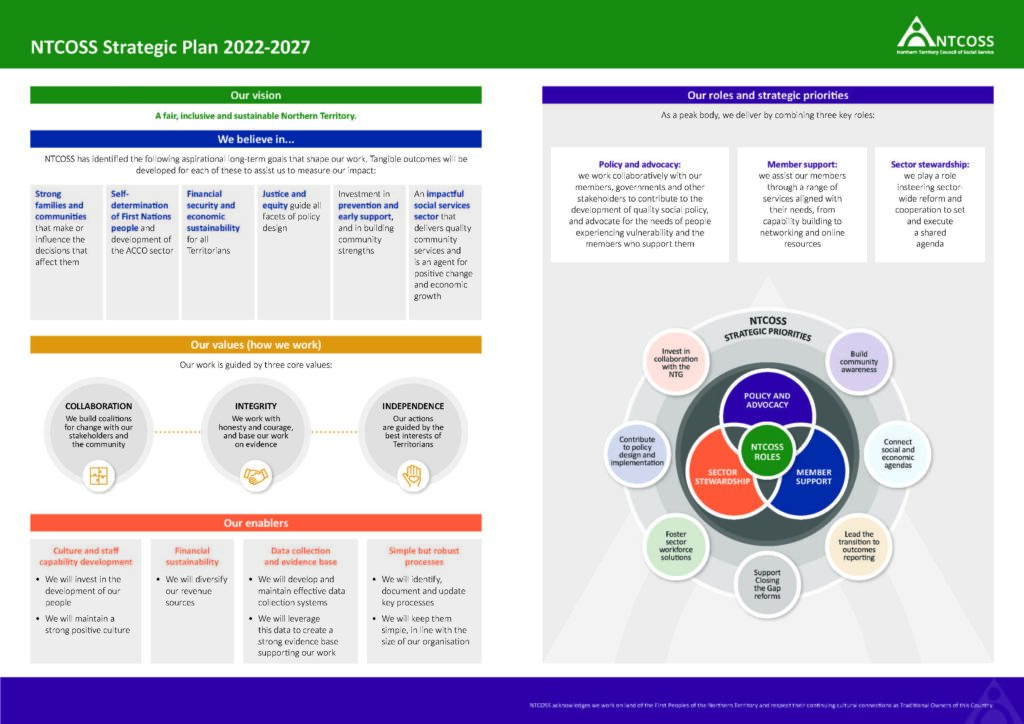About Us
The Northern Territory Council of Social Service (NTCOSS) is the peak body for the Social and Community Sector in the NT and an advocate for social justice on behalf of people and communities who may be affected by poverty and disadvantage.
We do not accept poverty, inequity or injustice in the Territory and believe all people should be treated with dignity and respect.
The NTCOSS team is located in both Darwin and Alice Springs, and for more than 40 years has worked with its membership base, government and other stakeholders to strive for better outcomes for Territorians.
NTCOSS represents a varied service sector, with members contributing different experiences and perspectives.
The Community Sector represents 20,000 Territory workers and volunteers and is one of the largest employers in the NT. It is made up of community managed, non-government, not for profit organisations that work in social and community service delivery, sector development and advocacy.
The Community Sector plays a vital role in creating social wellbeing for all Territorians and in building safe and healthy communities. The Sector provides services that enable people to access and participate in society, including health, education, employment, economic development and family and community life.
NTCOSS members are central to our work and advocacy. As a representative voice of the Sector to government, NTCOSS seeks to strengthen the Sector so that it can continue providing its essential services to the NT community.
More than one quarter of our population is Aboriginal – the highest in the nation – and a third of NTCOSS’s members are Aboriginal Community Controlled Organisations.
We support self-determination for Australia’s First Nations people and Closing the Gap.
We have failed our Aboriginal people, who continue to be affected by disadvantage and intergenerational trauma, which are the repercussions of historical policies such as the forced removal of children from families and the failed NT Intervention.
NTCOSS has recently helped achieve policy and legislative successes for Territorians working in partnership with our members to:
– Raise the age of criminal responsibility from 10 to 12 in the NT, with an ultimate aim of 14 years in line with international benchmarks.
– Pass the Anti-Discrimination Amendment Bill 2022, which modernised the law to provide far greater equality of opportunity and protections from unfair discrimination
– Introduce reforms that remove mandatory sentencing and mandatory non-parole periods for some offences to stop people being trapped in the criminal justice system.
Our Values
Social Justice
Integrity and Respect
Courageous Independence
Collaborative Leadership
Our Vision
Our Mission
Our Work
To have a positive impact on Territorians experiencing disadvantage, by working with others for strategic influence and with consideration of social, economic and environmental sustainability.
The National network of Councils of Social Service in Australia collaborate to achieve our vision of a fair, inclusive and sustainable Australia. The COSS Network is committed to achieving the best outcomes for people affected by poverty, disadvantage and inequity.
Australia’s Councils of Social Service (COSS’s) are the peak councils of the community welfare sector and the principal voice for people affected by poverty and disadvantage.
There are nine independent organisations, (one for each state and territory in Australia and a national body), which work together to reduce poverty and promote social justice.
Key Areas: the COSS network is active on many fronts in key areas of social and economic policy, including: social security and income support, community services, health, including mental health, housing and urban development, law and justice, rural and regional communities, Indigenous communities – rights and reconciliation, economic development and taxation, employment, education and training.
2022-2023
2022-2023 NTCOSS Financial Statements
2021-2022
